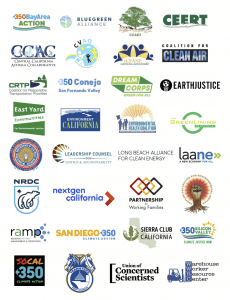To Liane Randolph,
Chair California Air Resources Board
1001 “I” Street
Sacramento, CA 95814
RE: Advanced Clean Fleets rulemaking
Dear Chair Randolph and Members of the Board,
We are 32 community, labor, environmental, health, equity, and science-based organizations working for racial, economic, social, and environmental justice in California. We are writing to express our support for the development of a strong and effective Advanced Clean Fleets (ACF) standard. Transitioning all trucks in California to zero-emission technologies by 2045 critically relies on this rule. In developing the specifics of this policy, we ask that CARB design a standard that achieves three key objectives:
-
The policy must prioritize transitions to zero-emission fleets that maximize emission reductions and technology investments in frontline environmental justice communities. The dire health burdens that CARB seeks to address with its rulemakings exist within and have been caused by a long history of discriminatory and exclusionary decision making. These decisions continue to disproportionately affect Black, Indigenous, people of color, and low income communities who have long carried the burdens of transportation’s externalities in our state. We request that zero-emission vehicle targets be met with the utmost speed and ambition and expect that CARB work to foster the conditions that make the strongest targets feasible. CARB must also work to intentionally rectify harms and direct benefits to frontline communities. We, as a society, must move past the point of allowing stubborn economic “impossibilities” to outstrip frontline communities of their health and lives. As we collectively navigate these unprecedented times, it is paramount that policy levers such as the ACF standard protect communities most burdened by the compounding public health crises of COVID-19 and racial injustice.
-
The policy should go beyond the production targets in the Advanced Clean Trucks (ACT) standard and support the goal of transitioning all trucks to zero-emission vehicles by 2045. The passage of the ACT standard in June 2020 was a significant step towards the widespread deployment of zero-emission trucks, yet it alone will not achieve the full transition to zero-emission trucks in 2045 set forth by CARB in the ACT resolution and Governor Newsom in Executive Order N-79-20. CARB should enumerate how policies under the ACF standard will electrify trucks beyond the ACT standard. We support CARB’s proposal to transition heavy-duty vehicles to zero-emission technologies by 2035 for drayage, public fleet, and last-mile delivery trucks; 2040 for refuse, local bus, and utility fleets; and 2045 for all other trucks and buses where feasible. Intermediate targets are needed to meet these long- term objectives and achieve near-term public health benefits. Thus, we support implementation of the ACF standard as soon as possible, including CARB’s concept that standards for zero-emission drayage trucks begin in 2023.In time for the Board’s consideration of the ACF standard by the end of 2021, CARB must also identify policy strategies and regulatory timelines beyond the ACF standard for achieving electrification of all trucks in the state no later than 2045. The CARB Board must provide sufficient internal resources to complete the analyses and stakeholder outreach necessary to advance this rulemaking. Clear milestones must also be set for the regulatory process to ensure its success and timeliness.
CARB should also establish a provision in the ACF standard that diesel trucks reaching the end of their useful lives be ineligible to operate in California and transition to zero-emission technologies. We support staff’s proposal for limiting the mileage and age of legacy drayage trucks, as presented at the workshop on December 9, 2020 and ask that a similar concept be applied to all fleet vehicles.
-
The ACF standard and complementary policies must support high-road trucking and charging infrastructure jobs, ensure the costs of zero-emission trucks do not fall on drivers, and include strong worker protections, particularly ending driver misclassification. Key sectors of the trucking industry, particularly port drayage, last- mile delivery, and long-haul, are largely fragmented and underpinned by illegal business models where trucking companies unlawfully force drivers to bear truck costs by misclassifying them as “independent contractors.” Courts and government agencies have documented widespread misclassification in key segments. Wage theft in the wake of fleet turnover at the Ports of Los Angeles and Long Beach as mandated by the 2008 Clean Truck Program has been extensively documented in investigative reports as “modern-day indentured servitude.” Misclassification continues to be the dominant model in port drayage (up to 85 percent of workers) and other trucking sectors such as last-mile delivery, long-haul, and specialized short-haul segments.1)Appel, Sam and Carol Zabin. 2019. Truck Driver Misclassification: Climate, Labor, and Environmental Justice Impacts. Berkeley, CA: UC Berkeley Labor Center. https://laborcenter.berkeley.edu/truck-driver-misclassification/ As long as the industry relies on individual drivers to purchase trucks and pay all related expenses – even in the rare instances where drivers are legitimate independent contractors – the full transition to zero-emission vehicles will not be feasible.
The ACF standard and complementary policies present an opportunity to transform the trucking industry for the better and create high-road jobs. CARB must identify strong policy strategies to ensure that licensed motor carriers – not individual drivers – are responsible for compliance. Public incentive funds must include rigorous standards to protect against abuse and incentivize compliance with labor laws.
The ACF rulemaking process represents a significant opportunity to reduce emissions from heavy-duty vehicles, stimulate local economies, and advance a holistic strategy that prioritizes frontline communities and benefits truck drivers. Eliminating emissions to achieve environmental justice depends on the simultaneous advancement of racial and economic justice. We look forward to working together to achieve this comprehensive vision for a healthy and just California.
Sincerely,
Kathy Dervin
350 Bay Area Action
Sam Appel
BlueGreen Alliance
Ivette Torres
Center for Community Action and Environmental Justice
John Shears
Center for Energy Efficiency and Renewable Technologies
Kevin Hamilton
Central California Asthma Collaborative
Dr. Catherine Garoupa White
Central Valley Air Quality Coalition
Jesse Marquez
Coalition For A Safe Environment
Bill Magavern
Coalition for Clean Air
Colin Fiske
Coalition for Responsible Transportation Priorities
Alan Weiner
350 Conejo / San Fernando Valley
Nicole Wong
Dream Corps Green For All
Paul Cort
Sasan Saadat
Earthjustice
Taylor Thomas
East Yard Communities for Environmental Justice
Dan Jacobson
Environment California
David Flores
Environmental Health Coalition
Leslie Aguayo
The Greenlining Institute
Jeremy Abrams
IBEW Local 569
Shayda Azamian
Leadership Counsel for Justice and Accountability
Tiffany Semoy Davy
Dave Shukla
Long Beach Alliance for Clean Energy
Roxana Tynan
Los Angeles Alliance for a New Economy
Patricio Portillo
Natural Resources Defense Council
Arnold Sowell, Jr.
NextGen California
Kathy Hoang
Partnership for Working Families
Jean Kayano
Peoples Collective for Environmental Justice
Joel Ervice
Regional Asthma Management and Prevention
Marie Chen
SanDiego350
Kathryn Phillips
Ray Pingle
Sierra Club California
Nicole Kemeny
350 Silicon Valley
Jack Eidt
SoCal 350 Climate Action
Ron Herrera
Teamsters Port Division
Jimmy O’Dea
Joyce Xi
Union of Concerned Scientists
Andrea Vidaurre
Warehouse Worker Resource Center
cc:
Richard Corey, Executive Officer
Edie Chang, Deputy Executive Officer
Steve Cliff, Deputy Executive Officer
Heather Arias, Division Chief, Transportation and Toxics Division
Sydney Vergis, Division Chief, Mobile Sources Control Division
View or download comment letter as PDF
References
| ↑1 | Appel, Sam and Carol Zabin. 2019. Truck Driver Misclassification: Climate, Labor, and Environmental Justice Impacts. Berkeley, CA: UC Berkeley Labor Center. https://laborcenter.berkeley.edu/truck-driver-misclassification/ |
|---|








